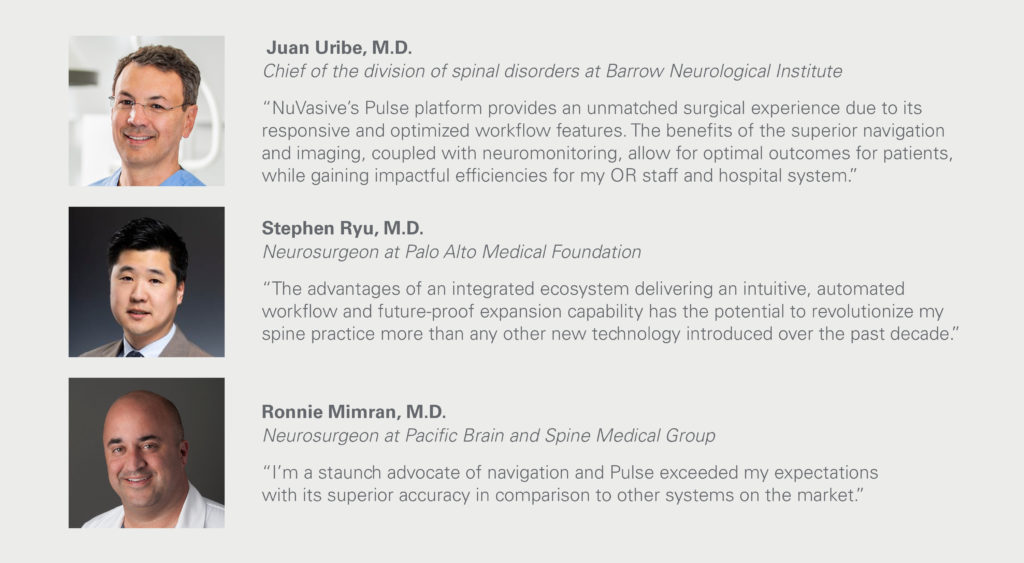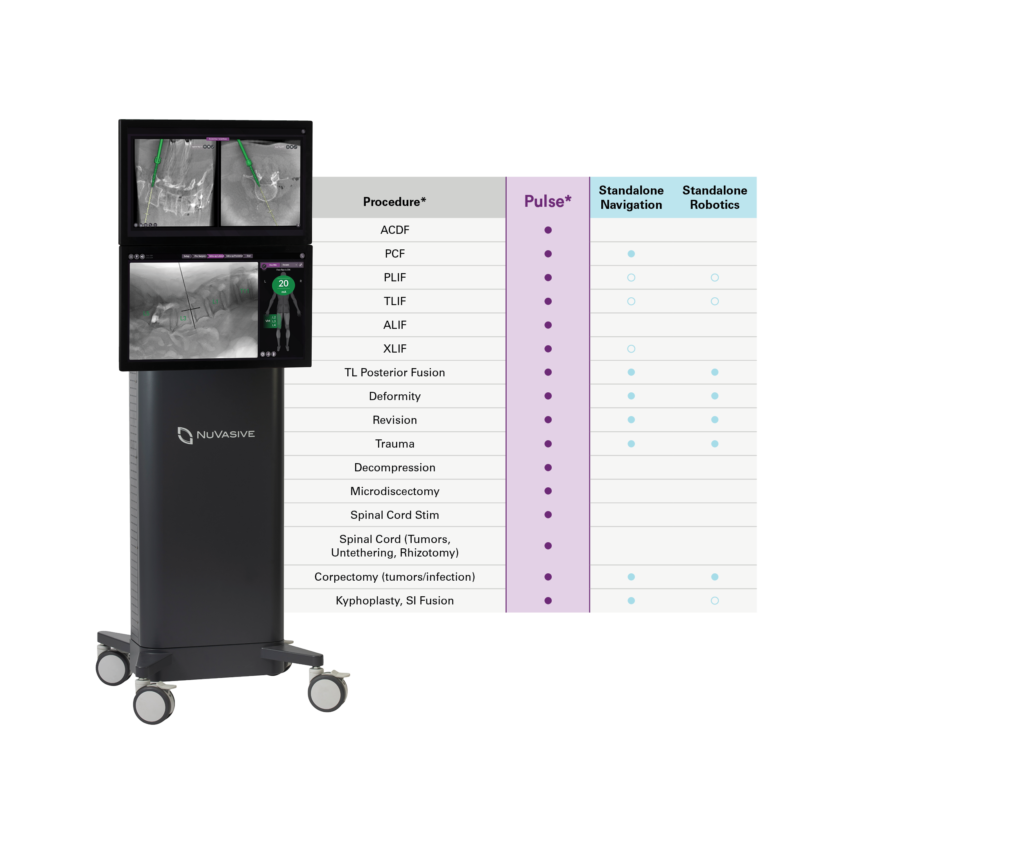
Early clinical experience demonstrates the Pulse system’s utility to improve workflow, reduce surgical variability and increase reproducibility of surgical outcomes
SAN DIEGO – July 10, 2019 – NuVasive, Inc. (NASDAQ: NUVA), the leader in spine technology innovation, focused on transforming spine surgery with minimally disruptive, procedurally integrated solutions, today announced the launch of the Pulse™ integrated technology platform. Pulse is the first, single platform to include multiple technologies designed to help surgeons adopt more efficient, less disruptive surgical approaches in all spine procedures. Engineered to improve workflow, reduce variability and increase surgical reproducibility, Pulse addresses a broader range of clinical challenges in the operating room (OR) compared to any other enabling technology in the spine market.
The Pulse platform combines neuromonitoring, surgical planning, rod bending, radiation reduction, imaging and navigation functions, with extensible capabilities to enable increased surgical efficiencies in the OR. These integrated technologies are designed to improve a surgeon’s ability to utilize minimally invasive surgery (MIS) techniques, which have been shown to reduce blood loss, hospital stays and result in less operative morbidity compared to open spine surgery.
“NuVasive’s Pulse platform provides an unmatched surgical experience due to its responsive and optimized workflow features,” said Juan Uribe, MD, chief of the division of spinal disorders at Barrow Neurological Institute in Arizona. “The benefits of the advanced navigation and imaging, coupled with neuromonitoring, allow for optimized outcomes for patients, while gaining impactful efficiencies for my OR staff and hospital system.”
NuVasive completed limited clinical release testing of the Pulse platform, providing initial validation that its structural design supports broad clinical utility throughout the entire surgery, and is useable in 100 percent of spine surgeries, from fusions to complex corrections. Its independent device access allows OR staff to simultaneously view the technologies’ imaging and insights in real time and in parallel, creating a seamless, optimized OR workflow. In addition, the open and modular architecture of the Pulse system allows for flexible technology packages, allowing surgeons to select the exact tools they need to address specific pathologies in spine surgery procedures.

“The Pulse platform is uniquely engineered to equip surgeons with a single platform of integrated technologies necessary to perform all spine surgeries, including minimally invasive approaches,” said J. Christopher Barry, chief executive officer of NuVasive. “Pulse provides an intuitive surgeon experience by anticipating user needs and fusing these technologies to create a seamless, optimized OR workflow, while addressing a broad range of clinical challenges. This is a pivotal step in our strategic vision to deliver end-to-end solutions that enable predictable clinical and economic outcomes in spine surgery.”
Pulse Platform Hardware and Software Modules
The Pulse platform includes the following enabling technologies, with a modular architecture allowing surgeons and hospitals the flexibility to meet their needs in all spinal cases:
- 2D- and 3D-Imaging and Navigation: Image transferring for both 2D- and 3D-imaging that combines novel camera, array and workflow technologies to improve line of sight, ease of use and surgical efficiency in the OR. Through NuVasive’s Spine Precision Partnership™ with Siemens Healthineers, Pulse leverages the Cios Spin cutting-edge 3D mobile C-arm.
- Surgical Planning with Integrated Global Alignment® (iGA®): Preoperative planning software that incorporates alignment parameters, implant integration, surgical modeling and other tools to help create a reliable plan prior to stepping into the OR. iGA is the only system on the market able to intraoperatively assess the surgical approach and effects on spinal alignment through real-time insights.
- Neuromonitoring: Automated nerve detection system with standardized setup and clinically validated alerts that help reduce variability and allow for faster interpretation of neural information.
- Smart Imaging with Radiation Reduction through LessRay®: Imaging system designed to take low-quality, low-dose images and improve them to look like conventional full-dose images. LessRay significantly reduces exposure to radiation for everyone in the OR by as much as 80 percent compared to standard fluroscopy.1
- Rod Bending with Bendini®: Spinal rod-bending technology used to create patient-specific rods, which are bent exactly to implant locations, expediting manual rod manipulation through computer-assisted bend instructions without leaving the OR.
The Pulse platform features extensible capabilities for robotics and smart tools and the Company plans to unveil its spine robotics module at the North American Spine Society 2019 Annual Meeting in September.
![]()

About NuVasive
NuVasive, Inc. (NASDAQ: NUVA) is the leader in spine technology innovation, focused on transforming spine surgery and beyond with minimally disruptive, procedurally integrated solutions designed to deliver reproducible and clinically proven surgical outcomes. The Company’s portfolio includes access instruments, implantable hardware, biologics, software systems for surgical planning, navigation and imaging solutions, magnetically adjustable implant systems for spine and orthopedics, and intraoperative monitoring service offerings. With more than $1 billion in revenues, NuVasive has approximately 2,600 employees and operates in more than 50 countries serving surgeons, hospitals and patients. For more information, please visit www.nuvasive.com.
Forward-Looking Statements
NuVasive cautions you that statements included in this news release that are not a description of historical facts are forward-looking statements that involve risks, uncertainties, assumptions and other factors which, if they do not materialize or prove correct, could cause NuVasive’s results to differ materially from historical results or those expressed or implied by such forward-looking statements. The potential risks and uncertainties which contribute to the uncertain nature of these statements include, among others, risks associated with acceptance of the Company’s surgical products and procedures by spine surgeons, development and acceptance of new products or product enhancements, clinical and statistical verification of the benefits achieved via the use of NuVasive’s products (including the iGA platform), the Company’s ability to effectually manage inventory as it continues to release new products, its ability to recruit and retain management and key personnel, and the other risks and uncertainties described in NuVasive’s news releases and periodic filings with the Securities and Exchange Commission. NuVasive’s public filings with the Securities and Exchange Commission are available at www.sec.gov. NuVasive assumes no obligation to update any forward-looking statement to reflect events or circumstances arising after the date on which it was made.
###
1 Wang TY, Farber SH, Perkins SS, et. al. Internally randomized control trial of radiation exposure using ultra-low radiation imaging versus traditional C-arm fluoroscopy for patients undergoing single-level minimally invasive transforaminal lumbar interbody fusion. Spine 2017;42(4);217-23.
Investor Contact:
Suzanne Hatcher
NuVasive, Inc.
858-458-2240
[email protected]
Media Contact:
Jessica Tieszen
NuVasive, Inc.
858-736-0364
[email protected]